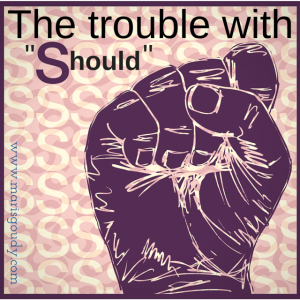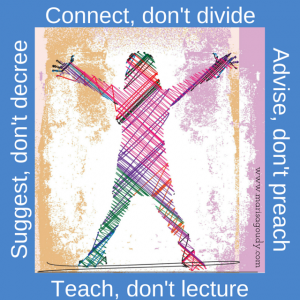Want to connect with your reader? Cut "should" from your writing
Sovereign Standard, Issue 19  Nobody likes a “should-er.” (No, not shoulder… we all need a shoulder to cry on sometimes and the entire game of baseball would be wrecked if there weren’t shoulders to rest the bats on.)
Nobody likes a “should-er.” (No, not shoulder… we all need a shoulder to cry on sometimes and the entire game of baseball would be wrecked if there weren’t shoulders to rest the bats on.)
 I’m talking about that evil “s” word - “should.”
I’m talking about that evil “s” word - “should.”
“You should…” reeks of unsolicited advice, shaming, and regret.
I check every piece of writing I publish to be sure that I avoid that “s word.” Readers come to me for insights into how to write brilliant stories and copy to support their creative work. You’re not coming to me for a wagging finger and the implication “you likely know better, but you’re still doing it wrong.”
“Should” damages personal relationships & teaching relationships
This is from Hannah Braime in Why the Word “Should” Can be Harmful and 3 Empowering Alternatives. Substitute “authority in your field” for “friend or partner”:
I realized that when I told other people they should or shouldn’t do something, I wasn’t respecting their ability to make the best decisions for themselves. That didn’t fit with my personal philosophy (that people are free to do what they want as long as they’re not harming others), and I knew I wasn’t being the best friend or partner while I was using “should”-based vocabulary.
I love what teacher John Spencer has to say about the problem with should. Replace “teaching” with “educating, engaging, and inspiring through content marketing”:
See, the problem with "should" is that it places all of teaching into rigid, binary, either/or, right/wrong boxes. It takes away the individuality, the autonomy, the creativity and the contextual knowledge required to teach well. Any strategy, any tool, any medium, any resources has benefits and drawbacks. The hard part, the part that requires patience and humility, is learning how to refine our craft as teachers based upon the needs of students.
But “should” is such a handy word for authorities, isn’t it?
Mentor and consultant Blair Glaser has made the brave and beautiful decision to leave leadership for authority. She’s making “authority” sexy - so stop thinking about buttoned up authority figures and start imagining a connected, compassionate someone who walks her talk and knows her stuff.
Her first paragraph in the blog post that announces her shift away from leadership and toward authority is laden with “shoulds” (underlines are mine!):
Read enough [books on leadership], and you’ll start to see a formula on how leaders should BE: authentic (hard for many to really know what that means); humble; curious; calm, empathetic, open, and funny.
You’ll also collect a list of behaviors of what leaders should DO: Serve (this can border on religious); listen more than talk, and empower by coaching.
They shouldn’t act bossy, they don’t “manage,” and, heaven forbid, they certainly don’t micromanage.
Blair goes on to describe her vision of authority (by the way, there isn’t a single “should” in the post once she starts riffing on her beloved new concept):
Personal authority comes from the ability and willingness to be the author of our own lives.
Authority in this context is the antidote to feelings of helpless and hopelessness, to the victim role. With a little work you can find your authority in almost any situation.
As I like to say, authority = confidence plus creativity. This is what makes authority irresistible as a force that will draw people to you.
Based simply on how Blair phrased these passages, what you rather strive to be -- a wannabe leader who is always looking over her shoulder trying to follow the shoulds and avoid the should nots OR an authority who employs creativity and confidence to be an irresistible draw?
You don’t need “should” to own your authority and offer advice that matters
The word “should” inherently separates.
If you berate yourself with “I should’ve…” language you’re creating a barrier between an ideal you and a real you that never measure up (I should eat better, I should sleep more, I should return emails faster…).
If you fill your writing with shoulds you stand apart from the reader, creating an ideal world that may make them feel inadequate.
 Connect, don't divide. Teach, don’t lecture. Advise, don’t preach. Suggest, don’t decree.
Connect, don't divide. Teach, don’t lecture. Advise, don’t preach. Suggest, don’t decree.
There’s almost always an alternative to “should” in any sentence you write. Substitute a more evocative, specific word and watch your blog posts and other professional writing take on a new tone that invites people to learn more from you - the compassionate, down-to-earth authority who is always there to help.
I’m always here to help you with your writing whether it’s in fine tuning your word choice or developing your editorial strategy. Learn more about what I have to offer on my services page.
